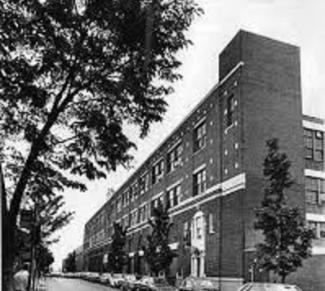
This episode is about Philadelphia industry. To view the site of the Stewart Distilling Company, look to 256 S 3rd St, just two doors from the Powell House. To view the site of the Abbotts Dairies Ice Cream Factory, travel South down 3rd St. On the right at Stamper St is the northern boundary of the factory location. The factory took up the entire block of Stamper St to the North and Lombard Street to the South.
256 South 3rd Street
Philadelphia, PA 19106
United States
The Philadelphia region’s long-held reputation as the “workshop of the world” did not prevent it from suffering the same loss of manufacturing firms and jobs that devastated the economies of other manufacturing centers. Local products ranged widely, from locomotives and ships to silk hosiery, wool carpets, machine tools, hand tools, lighting fixtures, steel, soup, and men’s and women’s apparel. With the exception of a limited number of large companies such as Baldwin Locomotive, Campbell Soup (in Camden), Cramp Shipbuilding, and Midvale Steel, most regional manufacturers were small- and medium-sized firms that specialized in customizing their products to consumers’ needs. Yet neither the diversity and quality of products nor the flexibility of their makers checked the region’s deindustrialization.
Philadelphia reached its largest number of manufacturing jobs in 1920, although the peak did not occur in its suburbs (Bucks, Chester, Delaware, and Montgomery Counties in Pennsylvania and Burlington, Camden, and Gloucester Counties in New Jersey) until about 1950. In part, city firms moving to the suburbs helped sustain manufacturing jobs in the wider region. The region’s deindustrialization after 1920 corresponded to the national trend that allowed for the aberrations created by the Great Depression and World War II followed a relatively constant downward slope. Deindustrialization thus began even before concern arose about either competition from foreign companies or outsourcing by U.S. companies.
Stewart Distilling Company
Sometime in early 1909, the Stewart Distilling Company was incorporated in Pennsylvania to consolidate the operation of two earlier companies; Carstairs Brothers’ Stewart Distillery and Carstairs, McCall & Co. The Stewart Distilling Company was located at 254-56 South Third Street, a four-story and basement double building. The location served as the firm headquarters and included a whiskey bottling plant and warehouse; however, the whiskey was distilled at a different location.
The company hit hard times with the introduction of prohibition in 1920. Despite the closure of the 3rd St location in Philadelphia, the company continued to operate from Baltimore. It continued to produce alcohol as there were several exemptions, such as for “medicinal whiskey”. However, the company faced legal issues with illegal alcohol sales. In one case “thirteen counts alleging illegal sale of 3,000 cases of whisky and twenty-five barrels in September 1922”. It, like many others, was in a tough spot and the company ceased to exist sometime in the late 1920s. During the urban renewal of Society Hill, the building was demolished and modern townhomes were built in 1970.
Abbotts Dairies Ice Cream Factory
The ice cream factory, located on 3rd and Lombard Street, first emerged in the early 20th century as the Lifters Ice Cream Company. Lifters Ice Cream Company was acquired by Abbotts Alderny Dairies Inc (founded 1876) in 1919 and continued to expand. The 1942 Land use map shows the factory occupying nearly the entire block. In 1960 Abbotts Dairies was acquired by Fairmont Foods, although the Abbotts name was retained as a division of Fairmont Foods. Fairmount itself was acquired in July 1980 by American Financial Corp. The ice cream factory continued to operate until December 1980 when the company announced its closure, citing only marginal profitability. Abbotts Dairies suffered significantly when one of its biggest customers, Fair Food Supermarkets, closed in 1979. The closure of the ice cream factory resulted in the loss of 106 jobs.
The factory was eventually torn down and in 1990 a parking lot was built on the vacant lot. In 2001 and 2002 a line of townhomes was built along Lombard street; however, the rest of the site remained a parking lot. More construction occurred in 2005 and 2006 with the remaining parking lot being developed into more luxury townhomes. Currently, the majority of these homes are worth between one and two million dollars.
Sources & Further Information
- Encyclopedia of Greater Philadelphia | Deindustrialization
- In ruins: How Philadelphia became the poorest big city in America
- Philadelphia's Industrial History: A Context and Overview
- Greater Philadelphia GeoHistory Network
- Abbots Ice Cream Plant Will Close, Philadelphia Inquirer, 9 Dec 1980
- US poverty rate: top 25 most populated cities 2019
- The Carstairs Were Philly Brahmins of Booze [pic]
- Stewart Distilling Company, Bay Bottles